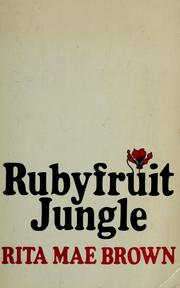Rubyfruit Jungle

First edition cover
|
|
| Author | Rita Mae Brown |
|---|---|
| Country | United States |
| Language | English |
| Genre | Novel |
| Publisher | VT: Daughters |
|
Publication date
|
1973 |
| Media type | Print (hardback & paperback) |
Rubyfruit Jungle is the first novel by Rita Mae Brown. Published in 1973, it was remarkable in its day for its explicit portrayal of lesbianism. The novel is a coming-of-age autobiographical account of Brown's youth and emergence as a lesbian author. The term "rubyfruit jungle" is a term used in the novel for the female genitals.
The novel focuses on Molly Bolt, the adopted daughter of a poor family, who possesses remarkable beauty and who is aware of her lesbianism from early childhood. Her relationship with her mother is rocky, and at a young age her mother, referred to as "Carrie," informs Molly that she is not her own biological child but a "bastard." Molly has her first same-sex sexual relationship in the sixth grade with her girlfriend Leota B. Bisland, and then again in a Florida high school, where she has another sexual relationship with another friend, the school's head cheerleader Carolyn Simpson, who willingly has sex with Molly but rejects the "lesbian" label. Molly also engages in sex with males, including her cousin Leroy when the two were younger. Her father, Carl, dies when she is in her junior year of high school.
In a combination of her strong-willed nature and disdain for Carrie, Molly pushes herself to excel in high school, winning a full scholarship to the University of Florida. Unlike Carrie, Carl had always supported Molly's goals and education. However, when Molly's relationship with her alcoholic roommate is discovered, she is denied a renewal of her scholarship. Possessing little money, she moves to New York to pursue an education in filmmaking. Upon reaching New York, she realizes that the rubyfruit is possibly not as delicious and varied as she had dreamed within the concrete jungle.
This work is notable for being an early literary lesbian novel. Many lesbian readers have found in it a reflection of their own experiences and observations. While some refer to it as "just another lesbian coming of age novel", its success is part of why the genre is now often considered a cliché. However, the book was criticized by psychological theorist David Halperin, who considered its savage ridiculing of "butch" culture to be heteronormative. In 2015, Rita Mae Brown was awarded the Lee Lynch Classic Book Award from the Golden Crown Literary Society for Rubyfruit Jungle.
...
Wikipedia
